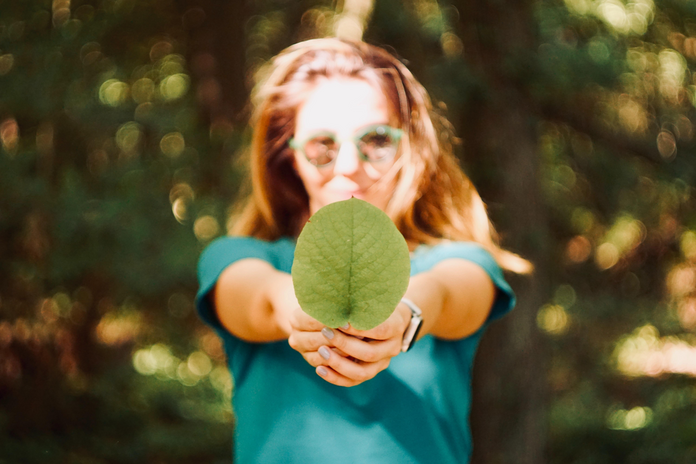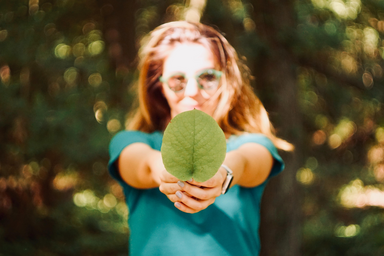The Her Campus National Editors write about products we love and think you’ll love too. Her Campus has affiliate partnerships, so we get a share of the revenue from your purchase. All products are in stock and all prices are accurate as of publication.
Last year, Earth Day celebrated its 50th anniversary, though gatherings were limited due to the COVID-19 pandemic. With cities and countries across the globe essentially shut down, people everywhere were forced to reimagine the ways they could contribute to advancing climate justice.
One way that environmentalists new and old have continued to engage is by reading books on the state of our planet. There are numerous resources to seek out when it comes to climate education, from scientific journals to essays to subject-specific works. Well-researched, accessible writing provides an important entry point into a multifaceted issue and can help you stay informed.
With young people at the forefront of much of the climate movement, finding ways to learn and take action is more critical than ever. Whether you’re just beginning to explore climate literature or you’re at a more advanced level, the following books are a great way to deepen your understanding of the planet and your place as a citizen of it.
- All We Can Save
-
Written by Ayana Elizabeth Johnson and Dr. Katharine K. Wilkinson, All We Can Save is a collection of essays and poems highlighting women’s voices in the climate fight. These contributors come from many different backgrounds and industries, with each offering a new insight as to how the climate crisis can be addressed. Various chapter sections allow readers to move throughout the book at their own pace and read about subjects they are most interested in while also discovering new topics. All We Can Save highlights the climate work that women have been doing for centuries across cultures and industries, and reinforces how it will take the collective effort of all people to face this challenge.
Book quote: “We need to have a whole cultural shift, where it becomes our culture to take care of the Earth, and in order to make this shift, we need storytelling about how the Earth takes care of us and how we can take care of her.”
- Youth to Power: Your Voice and How to Use It
-
Youth activist Jamie Margolin wrote Youth to Power as a guide for young people looking to take action on climate change. At 19 years old, Margolin has been an organizer and activist throughout her teen years. Following the 2016 presidential election, she co-founded Zero Hour, an international youth climate justice organization that has helped inspire fellow activists like Greta Thunberg. In Youth to Power, Margolin provides a toolkit for the first-time activist looking to get started. Her book offers advice on writing op-eds, organizing events and protests, utilizing social media and more. Margolin’s book also includes interviews with fellow youth activists and insight on how to sustain climate advocacy.
Book quote: “You don’t have to get it right on the first try. You don’t have to come from a wealthy or privileged background to start a movement. You don’t have to have all the knowledge and resources from the get-go. If you have a strong vision, resilience, and a refusal to give in, you can make waves.”
- Braiding Sweetgrass: Indigenous Wisdom, Scientific Knowledge, and the Teachings of Plants
-
Dr. Robin Wall Kimmerer is a plant ecologist and professor who guides readers through the world of botany as related to Native American traditions in Braiding Sweetgrass. In five essays, Kimmerer explores the interconnected relationship between scientific knowledge and Indigenous wisdom. She writes of how plants and wildlife are our oldest, most persevering teachers about the natural world and how they offer much in terms of climate consciousness. Kimmerer is a member of the Citizen Potawatomi Nation and draws on her understanding of both modern and traditional knowledge to describe a holistic approach to environmental conservation.
Book quote: “Knowing that you love the earth changes you, activates you to defend and protect and celebrate. But when you feel that the earth loves you in return, that feeling transforms the relationship from a one-way street into a sacred bond.”
- Trace: Memory, History, Race and the American Landscape
-
Environmental studies and geology professor Lauret Savoy dives into a study of American land and race in Trace. As both a personal narrative and social history, Trace reflects the ways in which race and history have marked the land and society we inhabit. Landscapes such as national parks, plantations, burial grounds, native territories, capital cities and more are home to revealing stories of our personal and collective histories. Savoy argues that the human response to these landscapes, including things like migration and displacement, has further embedded a sense of “place” for Americans who might not realize how closely they are tied to the country’s natural environment.
Book quote: “The American land preceded hate.”
- As Long As Grass Grows: The Indigenous Fight for Environmental Justice From Colonization to Standing Rock
-
Lecturer and Indigenous activist Dina Gilio-Whitaker documents Native peoples’ resistance to environmental exploitation and stolen land in As Long As Grass Grows. The book examines how Native groups were forced to confront injustices such as broken treaties, food insecurity, destruction of ancestral lands and the escalation of climate change. Gilio-Whitaker examines the intersections of white supremacy and capitalism through the lens of “Indigenized environmental justice,” and highlights the work of activists like those at the 2016 Standing Rock protest. She also discusses how Native women have historically been at the forefront of these protests and offers today’s environmentalists an important guide on how to navigate the climate fight.
Book quote: “There is no separation between people and land, between people and other life forms, or between people and their ancient ancestors.”
Caring for the environment should be a priority for everyone. Though the issue of climate change is complex and often unsettling, learning about environmental justice is an important step toward making the world a safer and healthier place for all.


